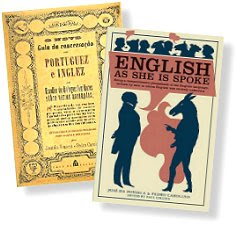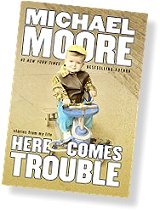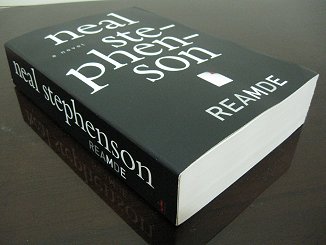Long before I dipped my toes into cyberspace, my journey into the strange, amazing and wonderful world was through books: encyclopaedias and those voluminous I-didn't-know-that books.
The Internet has made this indulgence much easier; it was while I was reminiscing about
typos past that I rediscovered an old favourite that had - and still does - left me gasping for air and my sides numb from laughter.
In an old volume of Reader's Digest's
Amazing Facts books is an article about what was claimed to be the world's funniest phrasebook.
O Novo Guia da Conversação em Portuguez e Inglez (
The New Guide of the Conversation in Portuguese and English) was first published in Paris in 1855, and was allegedly written by José da Fonseca and Pedro Carolino.
Though little is known about this
New Guide, one theory suggests that Carolino had based it on some or all of da Fonseca's earlier and better Portuguese-to-French phrasebook. His translation tool was a French-English dictionary, and he named da Fonseca as co-author to give the book some cred.
Which was understandable, since it was believed that Carolino did not speak English. So the author had to rely on literal translations, based largely on a word-to-word comparison, without much attention to grammar or syntax.
The result is an epic tour de force of linguistic FAIL that rivals the strongest forces of nature and set the GrammarSense™ of all English teachers ablaze.
Worse still, da Fonseca may not have been involved at all in Carolino's enterprise. Nor did he know that Carolino used his helpful little book to create a comedic masterpiece
and associated both their names with it.
"...for the care what we wrote him..."
The book, as the author describes it, includes a "choice of familiar dialogues, clean of gallicisms, and despoiled phrases" usually found in other similar works of the time.
He also hopes to fill the "imperfections and anomalies of style" found in other works that are due to the "corelessness" of rival publishers, "in spite of the infinite typographical faults which some times invert the sense of the period."
Oh no, don't leave yet! From here on, it gets better.
While I often get to read some classic and neo-classic examples of grammarcide, nothing compares to the piquant awesomeness of the
New Guide. Not even Nando's, which sounds Portuguese but is actually South African.
Remember, this guy thought he was
really teaching English, and this book was actually
published.
Craunching the marmoset
In Carolino's universe, people are involved in "trades" such as "coffeeman", "nailer", "Chinaman" and "lochsmith". Men use "the button-holes", "the buskins" and "the lining", while women have "the cornet", "the pump" and "the paint
or disguise".
In the kitchen, where dishes such as "some suger-plum[sic]", "a little mine" and "vegetables boiled to a pap" are prepared, expect such utensils as "the spark", "the smoke", "the clout" and of course, "the fire".
Wildlife observers can expect to see "quardruped's" such as the "rocbuck", "wild sow" and "dragon"; marine biologists can look forward to the "hedge hog", "calamary", "muscles", "wolf" and "torpedo".
Body parts include "the brain", "the inferior lip", "the brains" (what?), "the reins" and "the ham". Apparently, being left-handed is a disease. By the way, does anyone know where the superior and inferior lips are on the human body?
Also, good luck explaining your family tree with such terms as "the quater-grandfather", "the gossip mistress", and "an relation".
"It is a noise which to cleave the head"
The section on "Idiotisms and Proverbs" provides such gems of profundity as, "The necessity don't know the low."; "A horse baared don't look him the tooth." and "After the paunch comes the dance."
Break the ice with such "Familiar phrases" as, "Apply you at the study during that you are young."; "This wood is fill of thief's."; and "What is it who want you?" Discuss the weather with "There is some foggy."; "I fear of the thunderbolt."; and "The sun rise on."
Prior to sailing, someone may ask, "Don't you fear the privateers!" To which a captain might reply, "I jest of them; my vessel is armed in man of war, I have a vigilant and courageous equipage, and the ammunitions don't want me its."
Someone might ask a bibliophile such: "Do you like the reading good deal too many which seem me?" And the usual reply would be, "That is to me a amusement."
At the bookshop, one might enquire of the bookseller: "What is there in new's litterature?" To which an answer would be "Little or almost nothing, it not appears any thing of note." Puzzled, the customer would ask, "But why, you and another book seller, you does not to imprint some good wooks[sic]?" And the weary reply might sound like: "There is a reason for that, it is that you cannot to sell its. The actual-liking of the public is depraved they does not read who for to amuse one's self ant but to instruct one's."
"...it is perfect"
As far as I can remember, nobody is sure if da Fonseca "died of embarrassment" when the book came out, or what happened to Carolino after that.
Despite its ironic and epic FAIL as a serious phrasebook, an abridged edition was published in London by Field & Tuer in 1882. Entitled
English as She is Spoke, it was probably catalogued somewhere under "Humour", and would eventually be regarded as a classic source of unintended hilarity.
A different abridgement was published the same year in the US with an introduction by Mark Twain, who sounded quite enamoured with its contents. "In this world of uncertainties, there is, at any rate, one thing which may be pretty confidently set down as a certainty: and that is, that this celebrated little phrase-book will never die while the English language lasts."
Writer Stephen Pile, in
The Book of Heroic Failures, sums up the power of the
New Guide: "Is there anything in conventional English which could equal the vividness of 'To craunch a marmoset'?"
Which is perhaps why Twain was certain that "...nobody can imitate it successfully, nobody can hope to produce its fellow; it is perfect, it must and will stand alone: its immortality is secure."
Who can argue that?
This quasi-review/commentary of English as She is Spoke is based on the excerpts (at least I hope they are) from one of its abridged versions. I'm still hoping to get a copy of the real book from a local bookstore.
14/09/2014 It was also published in the 36th issue (October-December 2012) of the MPH Quill magazine (PDF file for the entire issue is here).
14/08/2023 At long, long last, you can
get a physical copy here.
English As She Is Spoke
Being a Comprehensive Phrasebook of the English Language, Written by Men to Whom English was Entirely Unknown
Jose da Fonseca, Pedro Carolino
edited by Paul Collins
McSweeney's Books (2004)
151 pages
Non-fiction
ISBN: 978-1932416114



















